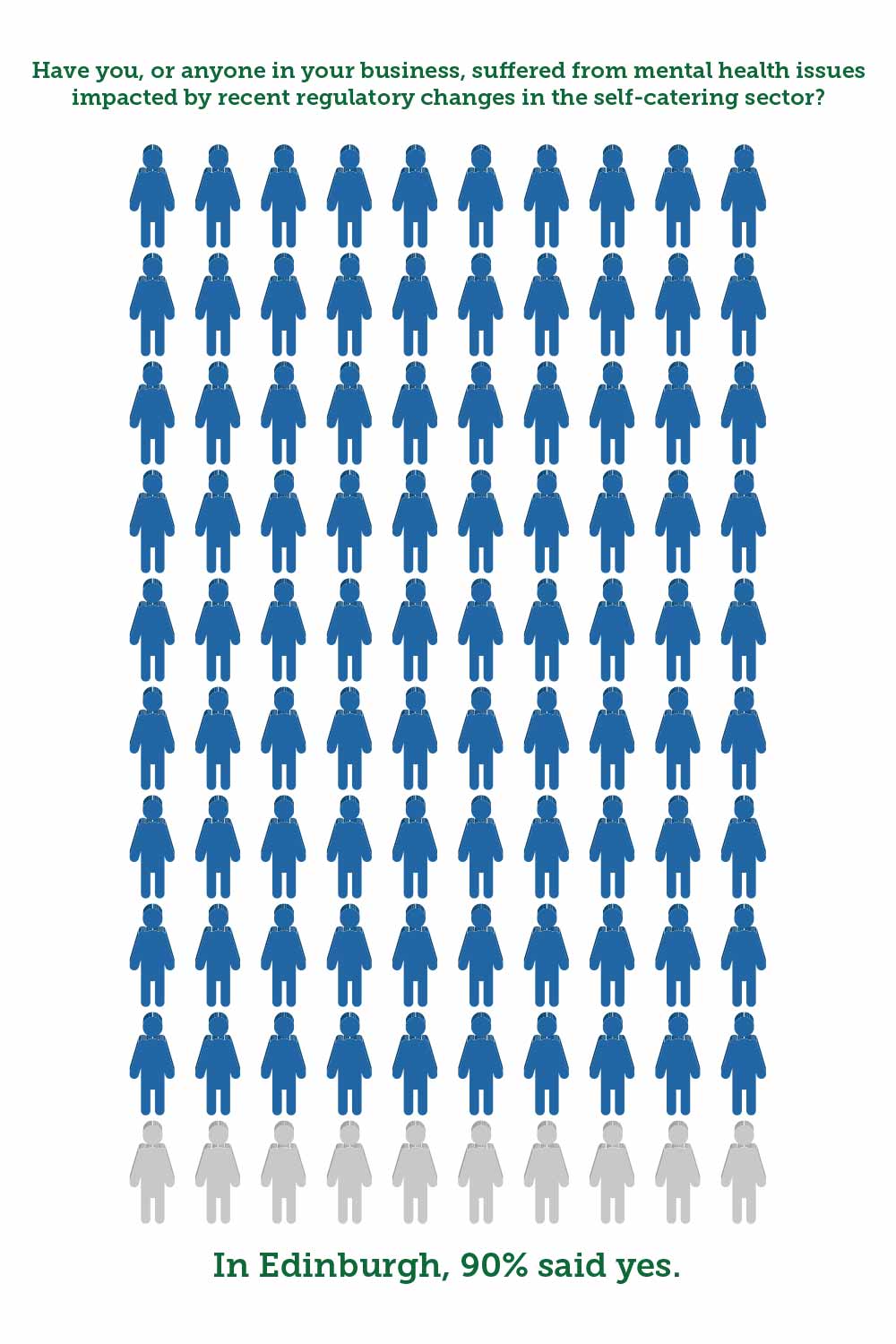New survey: government regulations causing spike in mental health problems in Edinburgh’s tourist sector
The Scottish self-catering industry highlights that Edinburgh-based operators report the highest levels of mental health issues in the country due the lingering threat of business closures.
A membership survey conducted by the Association of Scotland’s Self-Caterers (ASSC) shows that the Scottish Government’s short-term let regulations are causing a mental health crisis amongst small business owners.
In October 2024, around 450 operators were questioned by the trade body in an online survey as it continues to gather evidence around the impact of STL regulations.
Overall, around one-in-ten (11%) respondents said they had experienced no mental health issues as a consequence of regulatory changes. Incredibly, this figure drops to 0% in Edinburgh where the most stringent STL controls can be found.
The overwhelming sentiment is that the regulations have created financial strain, as well as increased anxiety and uncertainty, with sectoral discontent abundantly clear.
In terms of the key findings:
- Across Scotland, over two-thirds (68%) had either experienced a ‘negative’ or ‘extremely negative’ impact on their mental health and wellbeing from recent regulatory changes;
- This was particularly acute in Edinburgh where around 90% of operators had seen a negative or extremely negative impact; and
- Edinburgh also had the highest number of extremely negative responses (46%).
The professional and personal strain is taking its toll. Several respondents highlighted the emotional toll, such as sleeplessness, anxiety, stress-related health issues, and feelings of helplessness, especially with the uncertainty of future income and business viability. Many respondents also mentioned the high cost of compliance, administrative burdens, and delays in licensing applications, particularly for those relying on self-catering as their primary income.
These disturbing findings come as BiGGAR Economics published their independent analysis of the sector in Edinburgh. This showed it generated £154m in GVA and supported 5,580 jobs in 2023, while only having a negligible impact on housing with empty homes far outstripping the numbers of STLs.
Conscious to the issues facing small and micro businesses, the industry has attempted to work with national and local government to address the outstanding challenges to the regulatory framework but often to no avail. Edinburgh Council has now suffered a hat trick of legal setbacks, most recently with their u-turn over issuing three-month suspension notices.
Fiona Campbell, CEO of the Association of Scotland’s Self-Caterers, commented:
“Running a small business can be a rewarding experience but the last few years have been gruelling with the pandemic and cost of living crisis bearing down on everyone. Our survey highlights widespread concern amongst Edinburgh’s self-catering sector, with a clear negative impact on mental health due to recent regulatory changes.
What is causing particular anguish is the ominous threat that livelihoods will be snatched away due to heavy-handed government regulation, especially with the conflation of licensing and planning requirements. To compound matters, just as professional businesses have been shut down or are at threat of closure, we’ve seen a burgeoning black market of unlicensed accommodation, thereby undermining the entire purpose of the regulations.
Well-managed short-term lets can easily coexist within communities while contributing meaningfully to local employment and the economy. As BiGGAR Economics have shown, STLs support over 5,500 jobs in Edinburgh alone yet are vastly outnumbered by the number of empty properties in the city. That is where the policy focus should be directed rather than scapegoating an industry for housing challenges.
It has to be remembered that the very same individuals under the cosh have dedicated their working lives to ensuring the capital remains a welcoming and leading destination. Quite frankly, they deserve much better.”
ENDS
Notes to Editors:
- A copy of the full survey results is available upon request from the ASSC.
- Information about the BiGGAR Economics report can be accessed here: https://www.assc.co.uk/industry-news/new-report-further-reductions-in-short-term-lets-could-cost-edinburgh-economy-57m
For additional information, please contact:
Leslie Clark, Head of Policy, Halogen Communications
E: leslie@halogencom.com / T: 07518 420 885
